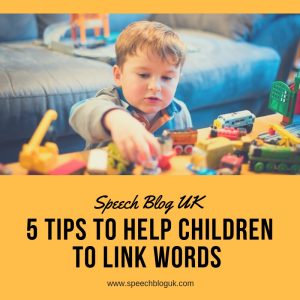I often see children for assessment who are using a few words, but have a limited range of language. Often these children tend to just say one word when they speak, rather than linking 2 or more words together. So today I’m going to talk about when children start to move on from single words and how to help them do that.
When do children start linking words?
When children have around 50 single words which they are using fairly consistently, they usually begin to link them together to make their own unique phrases. They may use these to indicate that they want something repeated (eg “more cake”!), or to indicate what they want to happen (eg “Mummy up” to ask to be lifted up). They may even start to use some describing words to talk about what they see (eg “red car” or “big teddy”).
I mentioned “unique phrases”. This is sometimes referred to as “novel utterances” as well. What this means is that they haven’t learnt the language as a chunk, but have selected the words and put them together themselves. Something such as “Peppa Pig” is technically 2 words, but it has been learned as one chunk.
Some children will link words before they reach the 50 words point. If they do, great. However, if not, just keep focusing on building up their range of single words using some of these strategies.
What sorts of words does my child need before they start linking?
First words are often nouns (words for people and things). For example, “mummy”, “daddy”, “car”, “ball”, “dog” – these sorts of words are often among a child’s first words. This is fantastic, but it’s hard to put a sentence together if you only have nouns to work with. Does your child use other sorts of words too? For example, do they use words such as “more”, “up” and “go”? Do they have any adjectives? These might include big and little or colour names. Do they have any verbs? (these are action words such as “running” or “sleeping”.
If your child only has around 50 words, it is unlikely that they have all of these. Don’t worry about that. However, if they don’t have any verbs or adjectives it might be difficult for them to start linking words yet. Look at some of the posts I have linked to for ideas of how to encourage these sorts of words.
How can I encourage my child to link words?
Here are 5 ideas to help your child link words. With all of these, don’t make your child repeat after you or put lots of pressure on them. Just keep using lots of 2-word phrases around them and hopefully they will start to get the idea. It might take a bit of time, so if they keep responding with single words to begin with don’t be discouraged! Keep on trying – a few minutes each day is best if you can.
- Repeat back what your child says and add one more word to it. For example, if your child says “teddy” you might say “yes, teddy sleeping”. In this way you’re showing them how to put their words together to make word combinations that interest them.
- Mealtimes can be a great time to encourage language – most children (and most adults!) are motivated by food. This is a great time, when your child says “more” to show them how to add to that to say exactly what they want. For example, you could say “more banana“. You could also try offering two options (eg “more banana or more cheese?”
- Look at books and family photos with your child and talk about what people are doing. For example, you might say “look, mummy’s walking”.
- Nursery rhymes and songs can be great for encouraging words and word linking too; the repetition really helps them to remember words, and learn language without realising it. Once your child is really familiar with a particular song, try stopping and seeing if they can fill in the next words. These will sometimes come into the category of “learned phrases” but they will still help your child to get started.
- Offer lots of choices. For example, if you are playing with vehicles, you might say “train crash or car crash?”. If you are playing with a doll’s house you might say “daddy sleep or baby sleep”.
What other strategies and activities do you use to help children with linking words?







Leave a Reply